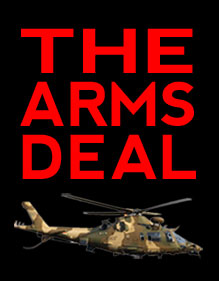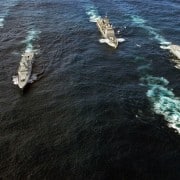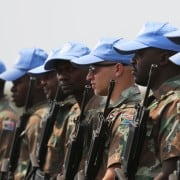|
Getting your Trinity Audio player ready...
|
 By Anine Kriegler and Murray Hunter
By Anine Kriegler and Murray Hunter
The arms companies have successfully avoided scrutiny at the Seriti Commission, essentially putting the whistle-blowers and critics on trial.
The absence of the arms companies from the Seriti Commission is telling.
The commission’s first phase was focused on the arms deal’s rationale – why the South African government bought what it did, the deal’s affordability and the performance of the “offsets” agreements.
As such, it reasonably called on witnesses from Armscor, various government departments and several former cabinet ministers (including Thabo Mbeki).
Phase two, intended to address the allegations of fraud and corruption, is hearing mainly from critics and observers who cried foul at the time of the deal or afterwards. This includes current and former MPs and anti-corruption researchers and activists. Only three remain – former ANC MP Andrew Feinstein, whose testimony started yesterday, and researchers Hennie van Vuuren and Paul Holden.
Only two members from the official (dismantled) investigations into arms deal corruption are scheduled to give testimony. And of perhaps dozens of people who have been implicated or faced allegations of impropriety in the arms deal, only two have been called to testify – former head of acquisitions, Shamin “Chippy” Shaik, and former adviser to Joe Modise, Fana Hlongwane.
Most significantly, not a single person from any of the European arms companies and shadowy “middlemen” are currently scheduled to testify. We will not hear from the alleged corrupters, those who profited from the arms deal far more handsomely than any procurement official could hope to. Their lawyers are there, certainly, ready to interject, but the companies themselves are invisible to the process – poltergeists in the room.
Instead, the commission appears to have put the arms deal’s critics and whistle-blowers “on trial”.
Those who have sought to help the commission by bringing evidence of wrongdoing to its attention, have been treated as if they are the subject of the probe.
A commission of inquiry is not a trial, in which the interested parties are expected to produce all the evidence and in which the party that avers a claim must prove it. For one thing, were this principle applied, it would require a formal process of discovery, where each party is given the opportunity to access the relevant documents in the possession of the other.
Despite the important role these corruption researchers could have played in supporting the commission’s work, they appear to have been treated more as a nuisance.
One would imagine the commission would use every opportunity to tap the knowledge of those who have worked on these matters for years. Instead the commission, in response to requests for access to information from Lawyers for Human Rights, wrote that it had no interest in allowing witnesses to conduct “their own parallel investigations into the same subject matter of the commission’s mandate”.
Upon the withdrawal of Feinstein, Holden and Van Vuuren, the commission’s statement was that it was unwilling to “help them find proof for the allegations of wrongdoing”. It is not, in short, for the “critics” to provide the evidence that could prove corruption; it is only for them not to knowingly give false evidence.
They are simply there to help the commission, where they can and where the commission deems fit.
Of course, all critics need to be cross-examined, so their evidence can be fairly tested. But the balance of power is simply unfair. On one side are powerful state and business interests, with the best lawyers money can buy, full and detailed knowledge of what happened (they were, after all, in the room at the time), with all the documents at their disposal, the excuse of 15 years in which to have forgotten everything and the reasonable presumption of innocence.
On the other side is a disparate and unresourced collection of independent voices, using whatever legal help they can scrounge. The commission’s rulings have hamstrung the critics, by preventing them at key moments from speaking directly to evidence of wrongdoing if it is contained in a document that they did not personally author.
At times the “critics” have been given just hours to prepare their own cross examination on the hundreds of pages of other witnesses’ statements. And for taking on this soul-sucking gauntlet in that grim, brown room, they earn nothing but the threat of criminal prosecution should they fail to satisfy the commission or criticise it in the wrong way.
More crucially, while there has been ample opportunity to examine the “critics” under the combined microscopes of the commission, the media, and the sharp-tongued Twitterati during this crucial phase of the inquiry, the same scrutiny has thus far failed to fall on those who are actually suspected of corruption.
So where are the arms companies? Britain’s BAE Systems, Sweden’s SAAB, Germany’s Submarine and Frigate Consortium, ThyssenKrupp and Ferrostaal, and France’s Thomson CSF are all absent from the witness list.
The commission should be hearing from any witness it believes may have played a significant role, may have a significant interest or may be implicated in the matters to which the inquiry relates.
It is striking that this has not yet come to include a single representative of any of the arms companies. Under South African law, both parties in a corrupt relationship (the giver and receiver) are guilty of a crime. One of them seems to have been able to keep itself invisible so far.
Of course, the commission’s failure to call on their evidence has not meant the arms companies are not in the room, making their presence felt. Their expensive legal teams and lobbyists are there every day the commission sits. They chip in where necessary, for example, to argue against the admission into evidence of a document that details how submarine co-contractor Ferrostaal paid $40 million (R441m) to gain “political access” it afterwards considered “decisive” to its successful South African bid.
So the arms companies are present enough to defend their interests and make things more difficult for those trying to help the commission with its work, but not present enough to have to answer any difficult questions.
Having been granted a year’s extension, the commission is as currently advised required by law to complete its work by the end of next month and to submit its report by six months after that.
It is running out of time to pin down the poltergeist.
* Anine Kriegler is a researcher on OpenSecrets.org.za and Murray Hunter is a convener of the Right2Know Campaign.
.jpg)






